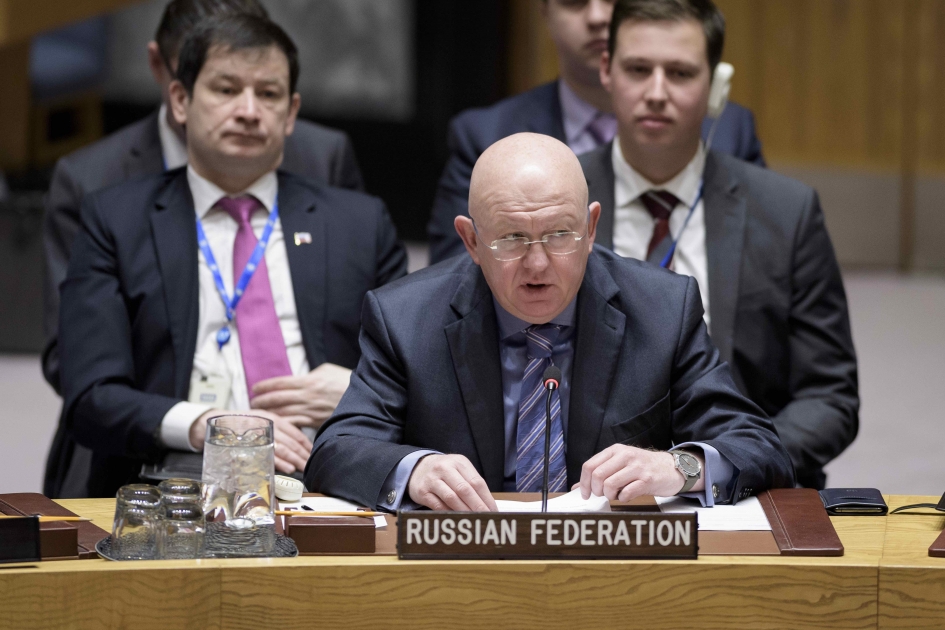Statement by Ambassador Vassily A. Nebenzia, Permanent Representative of the Russian Federation to the United Nations, at the Security Council meeting on the situation in Mali
We welcome Ms. Kamissa Camara, Minister for Foreign Affairs and International Cooperation of Mali, to today’s meeting, and thank Ms. Bintou Keita, Assistant Secretary-General for Political and Peacebuilding Affairs, for her briefing.
We are pleased that on the political front, the situation in Mali has remained generally stable. We welcome the efforts by Bamako and the Platform coalition and Coordination des mouvements de l’Azawad signatory groups to implement the Agreement on Peace and Reconciliation in Mali. We hope that in the runup to the assessment of the parties’ implementation of the peace agreement planned for March that they will take additional steps, particularly regarding the disarmament, demobilization and reintegration of combatants and the issue of territorial and administrative restructuring reform. If that is successfully achieved, the parliamentary elections postponed to the summer of 2019 will be held in much more favourable conditions.
We note Bamako’s efforts to restore Government institutions in northern Mali. The establishment of 10 interim district-level administrations in Kidal, Ménaka and Timbuktu is unquestionably a big step forward. In our view, using the United Nations Multidimensional Integrated Stabilization Mission in Mali (MINUSMA) to support the effectiveness of the work of these transitional structures would also be very helpful.
The Government and MINUSMA should be more active in their outreach efforts to explain the essence and meaning of the peace agreement and the role and tasks of the United Nations Mission to the people. As time has shown, the signing in October 2018 of the Pact for Peace between Bamako and the Special Representative of the Secretary-General has played a positive role in events in Mali.
The fact that representatives of the Platform coalition and the Coordination des mouvements de l’Azawad have joined it has given extra impetus to the implementation of the peace agreement and the road map. However, we want to point out that introducing more and more new sanctions will hardly help to genuinely consolidate the Malian parties around the agreements.
While we acknowledge the obvious positive advances in the Malian settlement, we feel obliged to point to other trends there that are unfortunately less encouraging. We are concerned about the continuing increase in the numbers of terrorist acts and we mourn the peacekeepers who have died in Mali. Human rights violations are ubiquitous, and inter-ethnic and intercommunal conflicts continue to simmer in central Mali. The presence of the authorities will be crucial to ensuring that they are fully resolved. In that connection, we take note of the results that the United Nations Mission has achieved in reconciling warring parties.
We are also worried about the worsening humanitarian situation. The numbers of people requiring assistance have gone up almost one and a half times over the past year. That is not normal. We call on all outside donors to fund the humanitarian appeal immediately. We should remember that in conditions of despair the only option that remains for Mali’s young people is joining the ranks of terrorist, extremist or criminal groups. In that regard, it will be extremely important to ensure that efforts to stimulate economic activity and restore social services in the central and northern areas of the country do not slow down.
We welcome the Government of Mali’s eagerness to take the process into its own hands and actively advance on a path to political normalization and economic stabilization. However, we want to point out that the situation in Mali is an important factor in African security as a whole. Achieving peace there would be easier if the situation in the region as a whole were normalized. The Libya factor continues to play a negative role in this. The ties between the terrorists operating in Mali and in the region as a whole are becoming increasingly clear.
In that regard, we support the countries of the Group of Five for the Sahel in taking concrete steps to form a Joint Force to combat terrorism and organized crime and hope that their role in ensuring regional security will grow.
